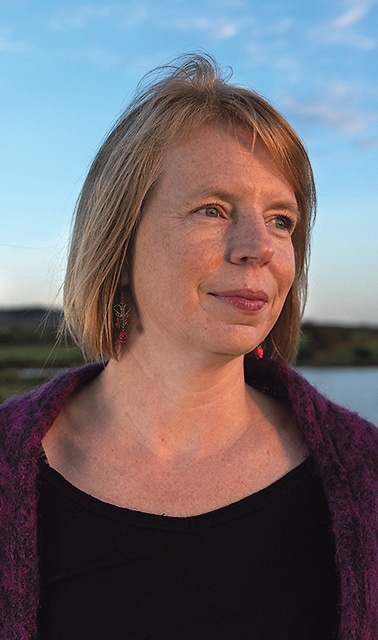
End of Life Matters
End of life Doula Melissa Murphy, a companion, guide and resource supporting our community in end of life matters.
www.starsbeyondourskin.com
Recent weeks have offered me more connection with our local palliative care services. Oftentimes, those I support as an end of life doula wonder about the concept – what it means for themselves and their families. With‘Palliative Care Week’ happening this month and I too having many questions, a palliative care nurse in the community offered me some insight.
My intention for writing about palliative care is to offer a broad, yet basic clarification. I wish to keep learning, along with others, about what it really is and what it is not. I’m beginning to understand that in the States where I once worked in healthcare, there is more of a distinction and separation between hospice and palliative care, whereas in Ireland the services are fluid and interchangeable. Palliative care can be received until the support is no longer needed or until the end of a life. According to thepalliativehub.com, a website highlighting palliative care week (September 10-16) while providing education about the services – “misunderstanding persists, meaning some people who could benefit are less likely to seek it.”
So firstly what is palliative care? I like this definition from one such organisation in the States: “Palliative care is a medical specialty that seeks to relieve pain, manage symptoms and reduce stress from a serious or life threatening illness.” The International End of Life Doula Association (INELDA) also had this to add: It’s for people of any age including children who can develop a serious health condition. It’s not a luxury – it is essential.” In Ireland, Palliative care is a free service not requiring a medical card (more on this at www.citizensinformation.ie). Other definitions that have been shared with me in recent days: “It’s another layer of care at any stage of life or illness; offering a bridge between one’s current medical care and palliative support.” And from the End Well Project in the States: “palliative care is a collaborative process, but it comes down to this simple truth: it is about treating the ‘whole’ person so they can continue living the best way possible on their terms.” Palliative care can consist of a team including physicians, nurses, social workers and chaplains.
There are a number of myths about palliative care that continually need unpacking, however there are also just as many truths to match. Here are a few that are especially important to name: Myths include: *Palliative care hastens death, * The service is only provided in a hospital, *It’s only for people who are dying of cancer, *Pain is just a part of dying. *Having palliative care means I have to give up seeing my GP, *Any other treatments I’m receiving must cease.
Truths: *Palliative care emphasises life and living; it’s care that focuses on improving quality of life. It is not to hasten or delay a health condition, rather it is life unfolding in its natural progression. While not every issue can be solved, the hope is that such care contributes significantly to an improved quality of life for all. *It can be received in a variety of settings – including as an outpatient at a hospital, a care home, in one’s own home. Palliative care is not a place. Indeed there are facilities with some designated beds, but often people will be admitted and then discharged once symptoms are more manageable. *Palliative care is for anyone with a serious illness, a chronic illness, or at the end of life. Everyone gradually faces old age, disease and dying. *Pain happens, but is not something to just endure. Many people are supported by palliative care as they are experts in symptom relief. In addition, other medical professionals globally learn from them. Other symptoms such as nausea, breathlessness, fatigue – to name a few – can be addressed to reduce impact and increase comfort. Pain is emotional too – palliative care also helps carers and families with mental health support; this includes stress relief with the education and services on offer. Knowing even that someone is a phone call away makes all the difference.*Service and support that are already providing care do not have to cease. Holistic and other treatments (from radiation to reflexology) and a steady GP can and do continue even while palliative care happens. Hence the title of this article – it takes a village!
As mentioned, I’ve accompanied a number of folks who have had palliative care involved. The feedback has been consistent – they feel more supported and resourced by the enhanced support of a palliative team. This may include some hands-on care relief for the primary carer. Perhaps a social worker has helped to address financial issues. Others feel their care overall is more coordinated and attentive. I once heard a medical professional say that the only downside to palliative care is that if you are referred, you might be turned away! Still there’s no harm asking for a referral from your GP or medical team to enquire about it. For me, it’s a pleasure to be able to tell folks about this service and to accompany those that have it. I can be of support in between palliative care contacts and liaise with them to make sure everyone is on the same page with the recipient’s healthcare wishes.
If you would like to read more about this topic, you can visit thepalliativehub.com or hospicefoundation.ie. There have also been many books written in recent years by professionals who have worked in or are currently affiliated with palliative care. A few that I’ve read and found meaningful include: A Beginners Guide to the End by BJ Miller and Shoshana Berger, With the End in Mind, by Kathryn Mannix and Dear Life by Rachel Clarke.
To learn more or to connect with Melissa, email her at starsbeyondourskin@gmail.com or visit www.starsbeyondourskin.com. She also welcomes your questions or ideas for future columns.


